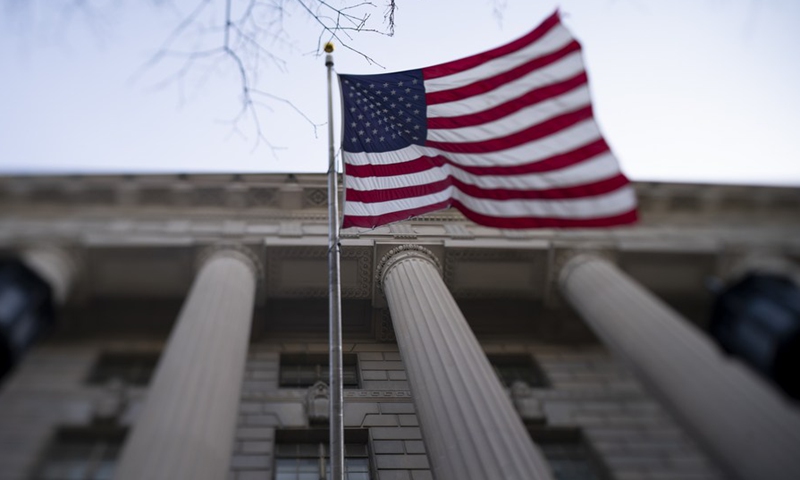
Photo taken on March 16, 2020 shows the White House Visitor Center in Washington D.C., the US. Photo: Xinhua
A bill to suspend the US debt ceiling was inked by President Joe Biden on Saturday, a much-criticized document that was clinched amid POTUS' months-long standoff with Republican House Speaker Kevin McCarthy.
The US Treasury's drive to start the massive sale of government bonds after the signing of the debt ceiling deal by POTUS "could wreak havoc," an American media outlet has reported.
The sales, due to kick off on Monday, are necessary to replenish the cash the Treasury burned through during the period of the debt ceiling-related emergency measures when it could not borrow more money.
The news outlet quoted JPMorgan Chase & Co. strategist Nikolaos Panigirtzoglou as saying that the Treasury-bill auctions, which total more than $170 billion, may complicate the effect of quantitative tightening (QT) on stocks and bonds.
According to Panigirtzoglou, the Federal Reserve's program of QT has already "eroded bank reserves, while money managers have been hoarding cash in anticipation of a recession."
QT is related to the Treasury's monetary policies that contract or reduce the Fed's balance sheet. The process is also known as the Fed's balance sheet normalization.
The JPMorgan Chase & Co. strategist estimated in this regard that as a result of the bond sales, a broad measure of liquidity may fall $1.1 trillion from about $25 trillion at the beginning of 2023.
"This is a very big liquidity drain. We have rarely seen something like that. It's only in severe crashes like the Lehman crisis where you see something like that contraction," Panigirtzoglou pointed out.
He was referring to the 2008 collapse of Lehman Brothers, the fourth-largest investment bank in the US after Goldman Sachs, Morgan Stanley, and Merrill Lynch.
The remarks followed US President Joe Biden signing the Fiscal Responsibility Act, known colloquially as the "debt ceiling deal," into law on Saturday, in a move to avert a potential government default that was expected in the coming week.
The final agreement, which was passed by the House on Wednesday and the Senate on Thursday, suspends the debt limit until 2025 - after the next presidential election - and restricts government spending.
When the debt ceiling was hit earlier this year, the US Treasury introduced "extraordinary measures" to pay the government's obligations, warning at the time that those measures would only last until sometime in the summer. As the summer neared, the Treasury department started giving more specific deadlines, first stating June and then specifying June 5 specifically.
Biden refused to negotiate with Republican Speaker Kevin McCarthy for more than a month, demanding that GOP members pass a debt ceiling increase without preconditions. The two finally started to communicate in mid-May.
Almost all Republican presidential candidates lined up against the bill, with Florida Governor Ron DeSantis insisting that the US "was careening towards bankruptcy before the debt deal, and it will still be careening towards bankruptcy after this debt deal." He argued that the agreement will not "solve our nation's fiscal problems."





